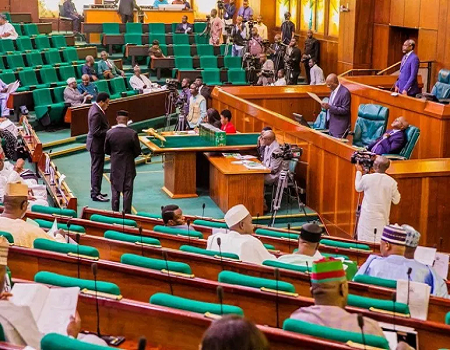A bill seeking to regulate the overseas education of public officials’ children has suffered a setback at the house of representatives.
The bill failed to pass second reading during the plenary session on Thursday.
Leading the debate, Sergius Ogun, an Edo lawmaker and sponsor of the bill, said the proposed legislation would strengthen indigenous institutions and provide efficient educational services.
Ogun said the bill seeks to stop public officials from utilising public funds to sponsor the education of their children or wards abroad.
He said the proposed legislation seeks to reduce brain drain, ensure good welfare conditions for indigenous academics, experts and professionals.
“Unfortunately, as a result of the inability of the government to provide quality education in its public educational institutions, Nigerians have resorted to private schools and foreign schools for their education.
“The bill does not prevent public officers or private citizens from sending their children/wards for studies abroad, it only seeks to ensure that a public officer who desires to send his/her child/ward abroad, does not divert public funds to so do.
“Thus, such public servant must first show that he/she has the legitimate means to sponsor his/her child/ward on such foreign education trip.
“The bill will help in fostering the development of our educational institutions as it will instil accountability and seriousness into public servants at all levels who are saddled with the responsibility of implementing the policies and programmes of government.
“The bill when enacted will help to redirect the huge funds that fly out to other countries, into the relevant sectors of our economy. It will bring about better facilities in our national life.
“This bill when passed into law will foster the fight against corruption which is one of the cardinal policies of this current administration.”
However, parliamentarians rejected the bill, saying it violates the rights and freedom of Nigerians.
Toby Okechukwu, deputy minority leader, expressed reservations on the provisions of the bill.
“My challenge essentially is within the realm that makes it look like all public officers that have their children overseas are corrupt and are doing so by assessing public funds,” he said.
“We have sent a number of our public officers to other jurisdictions as public servants. We have ambassadors, we have people who are in the diplomatic corps, who ordinarily in the course of their duty, would be occasioned to have their children’s school oversees.
“Secondly, is it likely that children schooling overseas is the reason why our educational institutions are not working effectively? We must make a distinction between hiring competent people who should man offices, who is responsible based on knowledge as against legislating for things that may not cure the problem.”
On his part, Chinyere Igwe, a lawmaker from Rivers state, said the bill breaches the provision of the constitution.
“It is with utmost duty and survival of Nigeria that I stand to oppose this bill. This bill offends the constitution and is null and void,” he said.
He said rather than address issues from the surface, the country should carry out a reassessment and reorientation to “determine the things that are affecting our public infrastructure in this country. It is not only education, the health sector, the roads and security”.
Nicolas Ossai, from Delta state, described the bill as “discriminatory”.
He said the bill is against the provisions of the 1999 constitution and should not be passed.
“This bill is against the constitution in terms of discrimination. I can’t be discriminated against or my children because I am in a position of authority,” he said.
“They have a right to be educated anywhere in the world. This bill offends the constitution, it is against the grand norm, it is against the operational compass upon which all laws lay their claims in Nigeria. This bill should not see the light of the day.”
TheCable had reported how Ogun was forced to step down the bill in the eighth assembly after lawmakers spoke against it.







